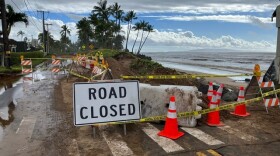-
Jeff Mikulina, chair of the Green Fee Advisory Council, spoke to HPR's Bill Dorman about recommendations on where and how to spend the revenue.
-
Green Fee Advisory Council Chair Jeff Mikulina shares how the $100 million in anticipated revenue from the green fee may be spent; the Pā‘ia Youth and Cultural Center is trying to relocate its facilities out of the way of sea level rise
-
Par Hawaiʻi plans to provide sustainable fuel to Alaska and Hawaiian Airlines; The British Museum has a new exhibition highlighting the Hawaiian Kingdom's diplomatic ties to Great Britain
-
House Bill 99 is meant to equip high school students with education "necessary to ensure that the next generation are climate leaders."
-
A federal appeals court is blocking Hawaiʻi from enforcing a climate change tourist tax on cruise ship passengers. The tax was set to begin in 2026.
-
University of Hawaiʻi at Mānoa economics professor Nori Tarui and UH Shidler College of Business graduate student Muhammad Talal Khan spoke with HPR's Maddie Bender about their research into sea level rise and its impact on Hawaiʻi's real estate value.
-
The state’s Green Fee on hotels and cruise ships to pay for climate resilience projects will go into effect in the new year. HPR's Ashley Mizuo reports on the court ruling largely dismissing a lawsuit by the cruise ship industry challenging the policy.
-
Hawaiʻi Sen. Glenn Wakai shares concerns about accountability after last year's deadly NYE fireworks explosion; University of Hawaiʻi researchers Nori Tarui and Talal Khan say sea level is devaluing coastal properties
-
A federal judge's ruling allows Hawaiʻi's new tourist tax, which includes a levy on cruise ship passengers, to take effect in 2026. The tax aims to raise funds to address climate change issues like eroding shorelines and wildfires.
-
ʻAulani Wilhelm, CEO of Nia Tero, spoke to The Conversation's Catherine Cruz about being on this year’s TIME100 Climate, a list of leaders driving climate action.
Play Live Radio
Next Up:
0:00
0:00
Available On Air Stations









